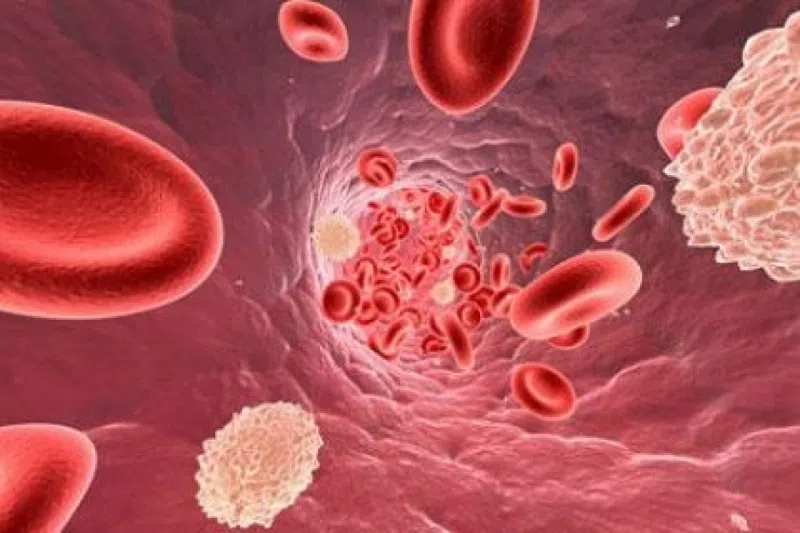Prothrombin is a precursor of the enzyme thrombin. It plays a key role in the blood clotting process. When prothrombin is activated, it turns fibrinogen— a protein dissolved in the blood—into fibrin, which forms clots.
An elevated prothrombin level increases the risk of thrombosis and thromboembolic conditions. In general, the more informative measure is not the prothrombin index itself, but rather the International Normalized Ratio (INR), which is widely used in medical practice to monitor blood clotting tendencies.
Prothrombin is produced in the liver with the active participation of vitamin K. The analysis of prothrombin levels in the blood can be presented in various forms: prothrombin time, prothrombin index, or the international normalized ratio (INR).

Prothrombin time (PT) refers to how many seconds it takes for blood plasma to clot. The prothrombin index shows the ratio between the clotting time of a healthy person and that of the patient, expressed as a percentage. These parameters are vital for assessing how quickly blood coagulates and help determine if there is a risk of developing blood clots.
When prothrombin levels are elevated, it is recommended to undergo 3–4 treatment cycles per year using natural remedies such as white willow bark and camphor tree bark. Here’s a simple method of preparation: Take one tablespoon of dried plant material, pour one cup of boiling water over it, boil it for 10 minutes, then let it steep for 45 minutes. Strain the mixture and take two tablespoons three times a day. Each treatment course should last for 10 days.
In addition to this, several other natural remedies and dietary recommendations can help thin the blood and regulate prothrombin levels:
Natural Blood Thinners and Dietary Tips
- Hydration is Essential
Drinking plenty of fluids—such as water, mineral water, juice, and broth—helps reduce blood viscosity. Vegetables with high water content, like cucumbers, also contribute significantly to keeping the blood thin. - Red Grape Juice
Freshly pressed red grape juice (preferably homemade) is particularly beneficial. Drinking just half a glass a day can reduce platelet activity by up to 75%, making it more effective than aspirin, which reduces it by about 45%. This makes grape juice a natural and potent antithrombotic agent. - Infusion of Cowberry (Lingonberry)
The infusion made from the fruit of cowberries is another excellent remedy. Its effect on blood clotting is comparable to aspirin. To prepare: crush two tablespoons of berries, pour boiling water over them, let it steep for 10–15 minutes, and then drink it warm. - Celery Juice
Celery contains a significant amount of natural sodium, which helps prevent the thickening of both blood and lymph. Regular consumption of celery juice can improve blood circulation and reduce clotting risks. - Raw Onions and Garlic
Including raw onions and garlic in your daily diet is strongly advised. Both have well-known blood-thinning properties, helping to maintain healthy circulation and preventing excessive clot formation. - Cherries (During Season)
Consuming 5–6 kilograms of cherries per season has a noticeable positive effect on blood composition. Cherries help reduce platelet aggregation and support vascular health. - Tomatoes
Tomatoes are particularly helpful in thinning the blood, especially the gel-like substance surrounding the seeds. This gel contains compounds that inhibit clotting and help maintain healthy blood flow. - A Must-Read: Which Plants to Use When Prothrombin Levels Are Elevated
Foods high in iodine, such as seaweed (kelp), reduce blood viscosity, improve vascular tone, and help lower blood pressure. However, excess iodine should be avoided, as it may cause imbalances and health issues. - Infusion of Yellow Sweet Clover (Melilotus officinalis)
This plant is known for its antispasmodic and blood-thinning effects. To prepare the infusion, take one teaspoon of the herb and add it to one cup of boiling water. Let it steep for 20–25 minutes. Drink 1/3 to 1/2 cup three times a day. This remedy helps relieve vascular spasms and improves blood flow. - Kiwi Fruit
Eating 2–3 kiwis a day can be especially beneficial for those with elevated prothrombin levels. Kiwi not only helps reduce clot formation but also supports cardiovascular health. It is particularly useful for preventing atherosclerosis, thrombophlebitis, and ischemic conditions by improving circulation and reducing inflammation.
By integrating these natural remedies and foods into your routine, you can manage elevated prothrombin levels more effectively. However, it is crucial to consult a healthcare provider before starting any herbal treatments, especially if you are already on blood-thinning medications, to avoid interactions or adverse effects. Preventive care, regular blood testing, and an informed lifestyle can significantly lower the risks associated with increased blood clotting tendencies.


















